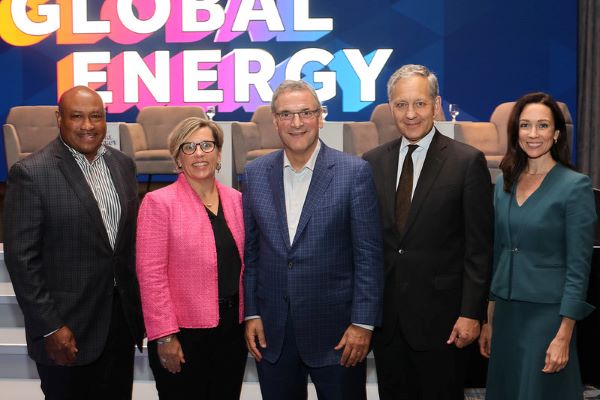Houston’s Energy Leaders Identify Funding, Workforce Development and Community Collaboration as Key Players in the Energy Transition
Published Jun 13, 2023 by Hailea Schultz
Houston's undeniable capabilities position it as a natural frontrunner to lead the energy industry through its transformative transition. However, to achieve this leadership role, key players must prioritize crucial aspects such as capital formation, workforce development, community engagement, and collaboration, as discussed at the Partnership's Future of Global Energy luncheon.
The luncheon convened over 800 energy professionals and a panel of experts who highlighted Houston’s rich history of energy talent, diverse innovation ecosystem, leadership and strong energy infrastructure, cementing its position as a key leader of the energy transition.
According to Bobby Tudor, CEO, Artemis Energy Partners and Chair, Houston Energy Transition Initiative, Houston has seen progressive growth in capital formation in the past few years. In 2021, capital inflows to Houston were $15 billion. Houston has also seen growth in venture capital funding, climbing from a national ranking of 8th place in 2017 to 6th place in 2021. Additionally, Tudor revealed that the number of energy transition-related private equity deals have increased dramatically since 2021.
Although Houston is experiencing capital growth on a large scale, the world still needs more funding and investments to reach net-zero by 2050. Tudor emphasized that “we can be the energy transition technical knowledge center AND financing capital,” but more collaboration between Houston’s established energy companies, startups and investors is essential.
In addition to funding, Dr. Ramanan Krishnamoorti, Chief Energy Officer, University of Houston, pointed to workforce development as a driving factor in the success of the energy transition during the panel discussion. 40 percent of Houston’s economy is dependent on the energy industry, making the continuation of job creation in this sector critical.
Through his position and experience at the University of Houston, Dr. Krishnamoorti has seen firsthand, the growing need for collaboration between the energy industry and young talent looking to enter the workforce. He stated that “we need to get people skilled up,” “continue to grow the grad population in the energy ecosystem,” and “make the energy industry more attractive to young talent,” so that Houston is not left behind as the world transitions into a clean energy future.
Adding to Dr. Krishnamoorti’s call to action for a stronger workforce development system, John Hall, President & CEO, Houston Advanced Research Center (HARC), emphasized that Houston’s large, underserved community has the desire to enter the energy workforce, but requires the attention and mentorship of the energy industry to get them there. “We have the opportunity to come together and do it well by providing increased opportunities for these communities,” Hall stated.
It is undeniable that Houston has what it takes to lead the energy transition, however, there is a common challenge leaders identified throughout the luncheon that needs to be addressed to be successful: collaboration.
The Partnership’s Houston Energy Transition Initiative (HETI) is at the forefront of bridging the gap between the energy industry and the rest of Houston’s community through its collaboration with Upskill Houston, Center for Houston’s Future (CHF) and Accenture, which will address workforce needs in the hydrogen sector. This effort will not only map key hydrogen careers, but it will also offer new opportunities for Houston’s disadvantaged communities to be part of the energy transition. With $20 billion planned in Houston-area Hydrogen projects by 2033, this effort is set to create an estimated 20,000 new jobs. These hydrogen roles could also lead to increased annual incomes for disadvantaged communities by an average of $28,000.
“We are showing that yes we can develop new industries in low-carbon energy AND we can do so by avoiding labor shortages while also uplifting residents from disadvantaged communities into high-demand, high-growth careers.”
—Bobby Tudor, CEO, Artemis Energy Partners and Chair, Houston Energy Transition Initiative
HETI is also currently working on an NSF Engine application with UT, A&M, Rice, University of Houston, Texas Southern University and Prairie View A&M, that will increase innovation in Houston’s energy industry through collaboration across these university systems.
“We have much more to do, but these cross-cutting initiatives will impact the distinct areas where Houston has a competitive advantage in the energy transition.”
—Bobby Tudor, CEO, Artemis Energy Partners and Chair, Houston Energy Transition Initiative
If the Houston community can work collaboratively to bolster its talent pipeline through training and leadership, engage and educate young talent in energy-focused careers, invest in and empower underrepresented communities and work effectively across all industries to increase energy projects and accelerate progress, then it has the power to lead the world to a clean energy future.
“The energy transition is going to happen, and it can’t happen without all of you, the energy capital of the world.”
—Dr. Evelyn N. Wang, Director, Advanced Research Projects Agency-Energy (ARPA-E)
Learn more about how Houston is leading the global energy transition.
 The Houston Report
The Houston Report




















